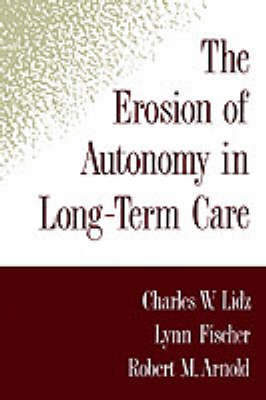
The Erosion of Autonomy in Long-Term Care
Seiten
1992
Oxford University Press Inc (Verlag)
978-0-19-507394-2 (ISBN)
Oxford University Press Inc (Verlag)
978-0-19-507394-2 (ISBN)
This volume is based on an observational study of two different types of settings which provide long-term care for the elderly.
In few places in American society are adults so dependent on others as in nursing homes. Minimizing this dependency and promoting autonomy has become a major focus of policy and ethics in gerontology. Yet most of these discussions are divorced from the day-to-day reality of long-term care and are implicitly based on concepts of autonomy derived from acute medical care settings. Promoting autonomy in long-term care, however, is a complex task which requires close attention to everyday routines and a fundamental rethinking of the meaning of autonomy.
This timely work is based on an observational study of two different types of settings which provide long-term care for the elderly. The authors offer a detailed description of the organizational patterns that erode autonomy of the elderly. Their observations lead to a substantial rethinking of what the concept of autonomy means in these settings. The book concludes with concrete suggestions on methods to increase the autonomy of elderly individuals in long-term care institutions.
In few places in American society are adults so dependent on others as in nursing homes. Minimizing this dependency and promoting autonomy has become a major focus of policy and ethics in gerontology. Yet most of these discussions are divorced from the day-to-day reality of long-term care and are implicitly based on concepts of autonomy derived from acute medical care settings. Promoting autonomy in long-term care, however, is a complex task which requires close attention to everyday routines and a fundamental rethinking of the meaning of autonomy.
This timely work is based on an observational study of two different types of settings which provide long-term care for the elderly. The authors offer a detailed description of the organizational patterns that erode autonomy of the elderly. Their observations lead to a substantial rethinking of what the concept of autonomy means in these settings. The book concludes with concrete suggestions on methods to increase the autonomy of elderly individuals in long-term care institutions.
1. The Meaning of Autonomy in Long-Term Care ; 2. How Did We Get There? A Brief History of the Nursing Home ; 3. The Setting and Research Strategies ; 4. The Value Basis of Long-Term Care ; 5. Caring and Cared For: Role Relationships in Long-Term Care ; 6. Restrictions ; 7. Activities and Schedules: The Routine of Daily Life ; 8. Interaction Patterns and Autonomy ; 9. Privacy: Access to Space and Property ; 10. Physical Redirection and Restraint ; 11. Summary and Implications for Long-Term Care
| Erscheint lt. Verlag | 10.12.1992 |
|---|---|
| Verlagsort | New York |
| Sprache | englisch |
| Maße | 244 x 164 mm |
| Gewicht | 454 g |
| Themenwelt | Medizin / Pharmazie ► Gesundheitswesen |
| Medizin / Pharmazie ► Medizinische Fachgebiete ► Geriatrie | |
| Medizin / Pharmazie ► Naturheilkunde | |
| Studium ► Querschnittsbereiche ► Prävention / Gesundheitsförderung | |
| Sozialwissenschaften ► Soziologie | |
| ISBN-10 | 0-19-507394-0 / 0195073940 |
| ISBN-13 | 978-0-19-507394-2 / 9780195073942 |
| Zustand | Neuware |
| Haben Sie eine Frage zum Produkt? |
Mehr entdecken
aus dem Bereich
aus dem Bereich
das Manual zur psychologischen Gesundheitsförderung
Buch | Hardcover (2023)
Springer Berlin (Verlag)
CHF 55,95
Orthomolekulare Medizin in Prävention, Diagnostik und Therapie
Buch | Hardcover (2022)
Thieme (Verlag)
CHF 81,80


